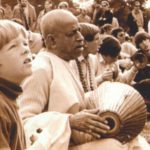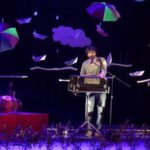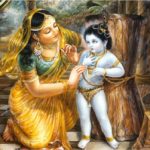“Śrīla Prabhupāda’s Kīrtana Standards,” installment 44 Not merely expertise During Śrīla Prabhupāda’s last weeks in Vrindāvan, as I recall, Bhavānanda Swami brought a group of six or ten Bengali devotees from ISKCON Mayapur who were expert kīrtana men to sing for Śrīla Prabhupāda. The men all came by train. But when they arrived, Śrīla Prabhupāda showed no interest in them. He heard their kīrtana once or not at all, and so they occupied themselves in chanting for the Deities, while Śrīla Prabhupāda listened to the rank-and-file devotees who chanted for him in his room and to his … [Read more...] about Ecstasy over Art
Articles about the Krishna Culture and Tradition
About the Krishna tradition in Manipur
Purity over professionalism, ecstasy over art
“Śrīla Prabhupāda’s Kīrtana Standards,” installment 43 From musician to Vaiṣṇava Coming now to a higher level of musical refinement, suppose one is expert in the techniques of classical Indian music. Does that make one’s kīrtana “better”? It may not, and may in fact make it worse. Śrīla Bhaktivinoda Ṭhākura, in his Jaiva Dharma, tells the story of Kalidasa Lahiri, a wealthy brāhmaṇa from Śāntipura: Early in his life, while he was still a young boy, experts in the field of Indian classical music had taught him, and he considered that such instruction qualified him to … [Read more...] about Purity over professionalism, ecstasy over art
Professional kīrtanīyas rejected
“Śrīla Prabhupāda’s Kīrtana Standards,” installment 42 An incident in Māyāpur illustrates Śrīla Prabhupāda’s disdain for mere musical skills without the spirit of pure devotional service. For the Gaura Pūrṇimā Festival in Māyāpur in 1977, Jayapatākā Swami arranged for a two-day Kīrtana Competition, which, as Lokanāth Swami remarks, “turned out to be the first and last of its kind.”1 With a view toward attracting kīrtanīyas and other Bengali people to ISKCON Māyāpur from outside ISKCON, various kīrtana groups were invited to take part in the competition, and ISKCON kīrtana groups … [Read more...] about Professional kīrtanīyas rejected
We are not professional musicians
“Śrīla Prabhupāda’s Kīrtana Standards,” installment 41 Concerning a saṅkīrtana party he wanted to form, Śrīla Prabhupāda wrote that the members should “perform Kirtana very rhythmically and melodiously.”1 Similarly he wrote: Chanting Hare Krishna does not require any artificial artistic sense, but still, if the procedure is presented rhythmically, then the people may be attracted more by the transcendental music.2 But Śrīla Prabhupāda consistently emphasized “transcendental” more than “music.” In 1969, when the first devotees in London were moving around to different … [Read more...] about We are not professional musicians
The “double clap”
“Śrīla Prabhupāda’s Kīrtana Standards,” installment 40 Another kīrtana innovation is the “double clap.” Instead of clapping hands to the standard 1-2-3 beat, at set intervals you clap hands twice in quick succession.1 This fancy maneuver may work well as part of a choreographed cultural presentation. But for normal kīrtana, where do we want to have our minds—on fancy clapping or on the sound of the holy name? In a Vyāsa-pūjā offering to Śrīla Prabhupāda, Jaya Gaurāṅga Dāsa wrote: So many times you corrected me while doing different things. Like the time I was sitting at … [Read more...] about The “double clap”
Long musical breaks
“Śrīla Prabhupāda’s Kīrtana Standards,” installment 39 In ISKCON kīrtanas in recent years, particularly at large events, one feature that has come into vogue is long musical breaks, in which a musician, with a saxophone or what have you, plays a few bars of the melody and improvises on them while everyone else looks on in appreciation. Perhaps because this might make some devotees feel uncomfortable (Where is Kṛṣṇa? Where is the mantra?), the devotees in the kīrtana often provide an explicitly divine overlay by calling out “Rādhe! Rādhe!” and then, in response, “Śyām! Śyām!” for as … [Read more...] about Long musical breaks
Gopī-gītā for Karttika
Śrīla Prabhupāda’s Kīrtana Standards,” installment 38 In accordance with śāstra and Vaiṣṇava tradition, Śrīla Prabhupāda had us chant the Dāmodaraṣṭaka every day during the month of Karttika. Some decades after Śrīla Prabhupāda’s disappearance, the chanting of the Gopī-gītā—the songs sung by the gopīs—was somehow introduced at ISKCON Vrindāvan as an additional daily Karttika function. During Śrīla Prabhupāda’s presence, this was never done. These most sacred and intimate songs are of course entirely authorized, but the Bhāgavatam offers so many prayers we could chant—prayers … [Read more...] about Gopī-gītā for Karttika
Ākharas (Added lines of elaboration)
What we chant in ISKCON’s daily program (continued) Śrīla Prabhupāda’s Kīrtana Standards,” installment 37 In my seminar on kīrtana standards, devotees have sometimes asked about ākharas. Bhakti Vikāsa Swami explains: Ākharas are lines added to songs for poetical effect. They are commonly used in Bengali kirtana to repeat or explain a point already made. They sometimes take the form of long poetical digressions. There are many standard ākharas for well-known Bengali songs. In ISKCON, only two simple ākharas are common: the lines gaurangera arotika sobha jaga jana mana lobha … [Read more...] about Ākharas (Added lines of elaboration)
Prema-dhvani
What we chant in ISKCON’s daily program (continued) Śrīla Prabhupāda’s Kīrtana Standards,” installment 36 The Prema-Dhvani (“Sounds of love”) are glorifications typically called out (in Hindi, by the way) at the end of a kīrtana. Śrīla Bhaktivinoda Ṭhākura includes one version of the Prema-dhvani in his Gītāvalī.1 And here is the way Śrīla Prabhupāda nearly always recited the Prema-dhvani:2 jaya oṁ viṣṇu-pāda paramahaṁsa parivrājakācārya aṣṭottara-śata śrī śrīmad bhaktisiddhānta sarasvatī gosvāmī prabhupāda kī jaya ananta-koṭi vaiṣṇava-vṛnda kī jaya nāmācārya śrīla … [Read more...] about Prema-dhvani
Tulasī Worship
What we chant in ISKCON’s daily program (continued) Śrīla Prabhupāda’s Kīrtana Standards,” installment 35 In the tulasī praṇāma, in the line vṛndāyai tulasī-devyai, the right word is devyai, not devī or devai. And the often-heard nivedena is a mispronunciation of nivedana, which denotes a request or appeal. Similarly, adhikoro is an attempted Bengali pronunciation that gets things only half right. What we want is adhikāro. And should we say kṛṣṇa-bhakti or viṣṇu-bhakti? The way Śrīla Prabhupāda gave us the mantra (in a letter to Govinda Dāsī dated April 7, 1970), it’s … [Read more...] about Tulasī Worship











You must be logged in to post a comment.